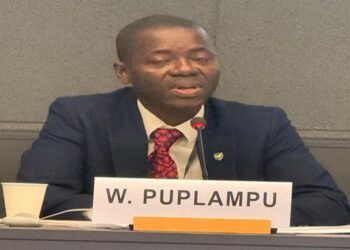The National Petroleum Authority (NPA) is set to implement significant reforms in Ghana’s downstream petroleum sector as part of a broader strategy to support the 24-hour economy initiative, a flagship policy of President John Dramani Mahama’s administration.
The policy aims to enhance economic growth, employment opportunities, and overall market efficiency by ensuring round-the-clock business operations across key sectors, including petroleum distribution and retailing.
Speaking at the 2025 Downstream Dialogue organized by the Chamber of Oil Marketing Companies (COMAC) in Accra, NPA Chief Executive Godwin Edudzi Tameklo outlined the Authority’s plans to modernize operations within the petroleum sector.
He revealed that the initial phase of the reform will include the deployment of automated fuel dispensers at select retail outlets and the introduction of policies to facilitate 24-hour operations at bulk storage facilities and fuel depots.
“The NPA remains committed to enhancing affordability, quality, and reliability in the supply of petroleum products.
“This aligns with President Mahama’s vision to reset and transform the sector while rolling out 24-hour economy solutions.”
Edudzi Tameklo,Acting Chief Executive Officer (CEO) of the NPA
The two-day forum, themed “Ghana’s Downstream Oil and Gas Sector: Challenges and Opportunities,” convened industry stakeholders, policymakers, and energy experts to deliberate on ways to optimize operations in the petroleum sector.
Mr. Tameklo underscored the importance of industry collaboration and called for stronger engagement between government agencies, private sector players, and international partners.
He stressed that regulatory oversight must be strengthened to enhance operational efficiency and market competitiveness.
“Excellence, transparency, and innovation must remain central to our efforts.
“By addressing structural inefficiencies and embracing technological advancements, we can ensure that Ghana’s downstream petroleum sector remains competitive and contributes meaningfully to national economic development.”
Edudzi Tameklo,Acting Chief Executive Officer (CEO) of the NPA
Over the past two decades, the NPA has implemented various regulatory frameworks to standardize pricing, supply, and quality control within the petroleum sector.
While these policies have facilitated industry growth, Mr. Tameklo acknowledged that they have also led to unintended challenges, including illegal fuel imports, credit risks, and inefficiencies in the distribution chain.
Balancing Energy Security and Climate Goals

Another major issue raised during the dialogue was the challenge of balancing Ghana’s energy security with the global shift towards cleaner energy sources.
The rising push for climate action worldwide has increased pressure on oil-dependent economies like Ghana to transition towards more sustainable energy solutions.
“The risk of stranded fossil fuel assets is real.
“We must take proactive steps to ensure the industry remains resilient while adapting to global energy transition trends.”
Edudzi Tameklo,Acting Chief Executive Officer (CEO) of the NPA
To mitigate these risks, the NPA plans to integrate renewable energy solutions into Ghana’s petroleum supply chain and promote investments in alternative fuels.
This aligns with broader national objectives to reduce carbon emissions while ensuring a steady supply of energy for economic activities.
If successfully implemented, the proposed reforms could have a far-reaching impact on consumers and businesses across Ghana.
The 24-hour economy strategy is expected to improve fuel accessibility, reduce waiting times at service stations, and create more job opportunities in the petroleum distribution and retail sectors.
Additionally, the introduction of automated fuel dispensers is anticipated to enhance operational efficiency and curb fuel losses caused by human errors or fraudulent activities.
The NPA believes that by leveraging technology, the sector can become more transparent and consumer-friendly.
However, industry analysts warn that implementing a 24-hour petroleum market will require significant infrastructural investments, including enhanced security at fueling stations, increased staffing levels, and reliable electricity supply for uninterrupted operations.
The National Petroleum Authority’s planned reforms represent a bold step toward modernizing Ghana’s downstream petroleum sector and supporting President Mahama’s 24-hour economy initiative.
However, the success of these reforms will depend on the commitment of all stakeholders, including government agencies, private oil marketers, and financial institutions, to invest in the necessary infrastructure and workforce needed to sustain round-the-clock petroleum operations.
As discussions continue, industry players remain cautiously optimistic that these changes will bring long-term benefits to Ghana’s economy and energy security.
READ ALSO: NSS Ghost Names Scandal: Nana Boakye Vows Legal Action























